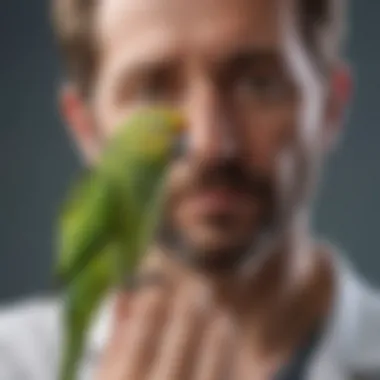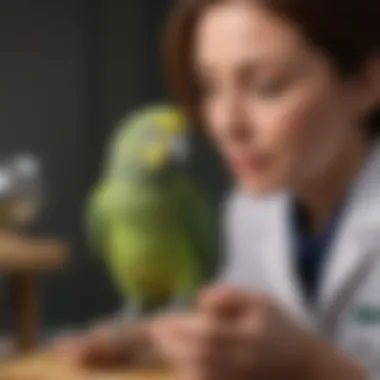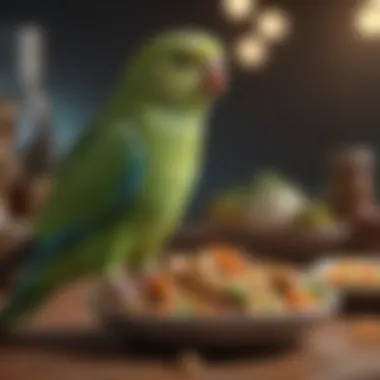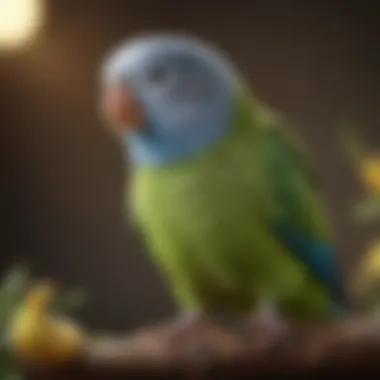Understanding the Role of a Parakeet Doctor for Pet Owners


Intro
Parakeets are beloved pets for many families. Understanding their specific needs is essential for their well-being. This article focuses on the important role of avian veterinarians in safeguarding the health of parakeets. These specialized doctors possess the knowledge necessary to address the unique challenges of avian care. Below, we will explore what it means to understand your pet and the critical aspects of their care.
Understanding Your Pet
Pet Behavior Basics
Parakeets are social creatures that thrive on interaction. Understanding their behavior can prevent issues arising from boredom or stress. Common behaviors include chirping, preening, and climbing. If you notice excessive screaming or feather plucking, these can be signs of distress or health issues. Observing your pet helps in recognizing any changes that may require attention from a parakeet doctor.
Common Breed Characteristics
Different parakeet breeds have distinct traits. For example, the English Budgerigar is generally larger and may have a calmer demeanor compared to the American Budgerigar, known for being more active. Knowing these characteristics helps in tailoring care specific to your pet’s breed, enhancing their overall quality of life.
Species-Specific Needs
Parakeets have unique dietary and environmental needs. They require a varied diet rich in seeds, fruits, and vegetables. It's vital to consult with an avian vet to ensure you meet these nutritional requirements. Moreover, the living environment should be spacious and enriched with perches, toys, and safe materials to keep them entertained.
Pet Care and Maintenance
Feeding Guidelines
A balanced diet is key to a parakeet's health. High-quality pellets, along with an assortment of fresh fruits and vegetables, should be the staples of their diet. Foods to avoid include avocado and chocolate, as these are toxic to birds. Always remember to provide fresh water daily.
Grooming Essentials
Regular grooming keeps parakeets healthy. This includes nail trimming and beak care. Ensuring they have access to cuttlebone aids in wearing down their beaks naturally. Bathing is also important. Mist them lightly with water to keep their feathers clean and free from debris.
Hygiene Practices
Hygiene is significant for preventing illnesses. Regularly clean the cage, food and water dishes, and toys to mitigate health risks. A clean environment minimizes the chance of infections or diseases.
Health and Wellness
Routine Vet Check-ups
Regular veterinary visits are crucial for monitoring your parakeet's health. Avian vets examine physical condition, check for parasites, and ensure vaccination is up-to-date. Establishing a routine can help catch potential issues early.
Vaccination Needs
Just like other pets, parakeets need vaccinations. Specific vaccines protect against common diseases. Consult with a qualified avian vet to ensure your bird is on a proper vaccination schedule.
Recognizing Signs of Illness
Identifying potential health issues early can be lifesaving. Look for behavioral changes, such as decreased activity or a change in eating habits. Any signs of respiratory distress or abnormal droppings are indicators to seek veterinary care immediately.
Enrichment and Activities
Indoor vs. Outdoor Activities
Creating a stimulating environment is vital. Indoor play areas with safe toys will keep them engaged. If safely possible, supervised outdoor time can also provide mental stimulation. However, it’s crucial to protect them from predators and environmental hazards.
Interactive Toys and Games
Parakeets enjoy toys that challenge their intelligence. Puzzle toys or foraging games can reduce boredom and promote natural behaviors. Regularly changing toys helps maintain their interest.
Socialization Opportunities
Socialization is essential for parakeets, as they are highly social birds. When possible, interact with them regularly. Introducing them to other birds should be done carefully, ensuring they are compatible. This promotes a sense of community and can enhance happiness.


"Understanding the specific needs of your parakeet can significantly improve their quality of life and strengthen your bond with them."
Prologue to Parakeet Health
Understanding the health of parakeets is essential for any owner that wishes to keep their feathered companions thriving. Parakeets, like all birds, are vulnerable to a wide range of health issues that can arise unexpectedly. This article aims to shed light on the nuances of avian health care, specifically focusing on parakeets. The physical and psychological well-being of these birds is not only crucial but can also be quite complex. Owners must be well-informed and proactive in addressing their pet's health.
Proper knowledge allows owners to recognize early signs of illness, ensuring timely intervention. Gains in awareness and understanding of parakeet health can lead to enhanced longevity and a more fulfilling relationship between the bird and its owner. Moreover, consistent health evaluations can help mitigate many common ailments, reducing the need for serious medical interventions later.
Key areas of focus in this section include
- Basic anatomy relevant to critical medical assessments.
- The importance of regular veterinary check-ups.
- Understanding various avian diseases that may affect parakeets.
Understanding the Parakeet’s Anatomy
A solid grasp of the parakeet's anatomy can significantly aid in understanding their health needs. Parakeets possess a unique structure that makes them both fascinating and somewhat delicate. They have a lightweight skeletal system that allows for agile movement. However, this also means their bones are more susceptible to fractures and other injuries.
Key components include:
- Respiratory System: Parakeets have a highly efficient respiratory system that is more complex than mammals. Issues in this system can lead to rapid health decline.
- Digestive Tract: They have a gizzard that aids in grinding food, which is essential for their digestion. Understanding this can assist in recognizing dietary-imposed issues.
- Feathers and Skin: These birds rely on their feathers for insulation and flight. Skin conditions can therefore lead to more severe health problems if not addressed swiftly.
The Role of the Avian Veterinarian
The avian veterinarian plays a critical role in the health care of parakeets. Their training equips them with the tools to diagnose, treat, and manage various conditions that can affect these birds. The approach is often comprehensive, combining physical examinations with behavioral assessments to understand the overall well-being of the bird.
Key responsibilities include:
- Diagnosis: Using specialized equipment to diagnose conditions that may not be visible to the untrained eye.
- Preventative Care: Regular vaccinations and routine exams help catch potential issues before they become severe.
- Emergency Care: Being available during emergencies can be lifesaving. Avian veterinarians are trained to handle sudden health crises effectively.
"An ounce of prevention is worth a pound of cure" – this saying rings especially true in avian care.
In summary, the interplay of anatomy and veterinary care is vital for maintaining the health of parakeets. Owners who take the time to understand these aspects will be better equipped to ensure their pets live healthy and enriched lives.
Common Health Issues in Parakeets
Understanding the health issues common to parakeets is essential for any owner who wants to ensure the long-term well-being of their pet bird. Parakeets, like all animals, are prone to various ailments that can affect their quality of life and longevity. Awareness of these issues not only aids in early detection but also in the selection of appropriate treatment options. Addressing health problems quickly can lead to better outcomes, while neglecting them may result in severe consequences. The goal is to arm parakeet owners with relevant information that can assist in recognizing symptoms and acting swiftly.
Respiratory Problems
Respiratory issues are frequent concerns in parakeets that can arise from a range of factors including environmental conditions and infections. Symptoms may manifest as wheezing, coughing, or nasal discharge. Poor air quality, which can be a result of dust, smoke, or aerosol exposure, often triggers such problems. Moreover, parakeets are sensitive to temperature fluctuations. Elevated levels of stress can further exacerbate respiratory conditions.
It is important to monitor your bird's behavior closely. Difficulties in breathing are often signs that immediate veterinary attention is needed. From experience, avian veterinarians can determine if the underlying issue is due to an infection, such as viral or bacterial pathogens, or if it is linked to environmental factors. Treatments may include changes in living conditions, medications, or supportive care tailored to the specific diagnosis.
Digestive Disorders
Digestive disorders in parakeets may include situations such as diarrhea, vomiting, or changes in appetite. These issues can emerge from dietary imbalances, ingestion of toxins, or infections. A healthy digestive system is crucial for nutrient absorption, making it a significant aspect of your bird's overall health.
Common symptoms to watch for include sudden weight loss, lethargy, or abnormal droppings. Regular monitoring of what the parakeet consumes is key for prevention. Introducing a balanced diet consisting of high-quality pellets, fresh fruits, and vegetables can mitigate risks. In severe cases, avian vets might recommend specific treatments, ranging from dietary adjustments to medication, depending on the diagnosis.
Skin and Feather Conditions
Skin and feather conditions can easily disrupt a parakeet's life. Issues such as feather plucking, skin irritation, or infection often point to underlying health issues. Psychological factors, environmental stressors, or nutritional deficiencies can lead to these behavioral changes, often resulting in visible deterioration of feathers or skin.
A healthy coat of feathers is not just aesthetic; it is crucial for maintaining proper body temperature and aerodynamics during flight. When encountering these issues, observing your bird's behavior is important. Consulting an avian veterinarian is essential for accurate diagnosis and treatment. The treatment could involve changes in diet, topical applications, or other forms of veterinary intervention to promote healing.
Understanding these common health issues can serve as a preventative measure for parakeet owners. Knowledge empowers you to act promptly and decisively for the well-being of your pet.
Preventive Care and Health Maintenance
Preventive care and health maintenance are vital aspects of caring for parakeets. These practices are essential not only for the immediate well-being of the bird but also to promote long-term health. By avoiding serious health issues before they arise, parakeet owners can ensure that their feathered companions live a happy and healthy life. Regular check-ups, vaccinations, and proper nutrition are three pillars that support a proactive approach to avian healthcare.


Regular Veterinary Check-Ups
Regular veterinary check-ups are integral to the preventive care of parakeets. These appointments allow avian veterinarians to monitor the general health of the bird and catch any potential problems early. A thorough examination will typically assess the parakeet's weight, feathers, skin, eyes, and beak. This practice can help detect signs of illnesses that may not yet be visible to the untrained eye.
During these visits, veterinarians will evaluate the parakeet's behavior and eating habits. Sudden changes can indicate health issues. Moreover, during the check-up, the vet may also provide guidance on habitat care and behavioral enrichment. Investing in regular check-ups reduces long-term costs for pet owners, as prevention is often more economical than treatment.
Vaccinations and Health Screenings
Vaccinations and health screenings play a crucial role in safeguarding the health of parakeets. Just like other pets, parakeets benefit from vaccinations to protect against certain diseases. Common vaccinations include those for polyomavirus, avian influenza, and Newcastle disease. These vaccinations can save lives and prevent outbreaks in a home where multiple birds reside.
In addition to vaccinations, regular health screenings are important. They can identify infections or other health concerns before they become serious. These screenings often include blood tests and fecal examinations, which provide insights into the bird's overall health and environmental conditions. Keeping a regular schedule for vaccinations and screenings is an essential part of a parakeet’s healthcare routine.
Importance of Proper Nutrition
Proper nutrition is the cornerstone of good health for parakeets. A well-balanced diet helps prevent malnutrition and foodborne illnesses. Parakeets require a variety of foods, including pellets, seeds, fresh vegetables, and fruits. Each component contributes to their nutritional needs. Pellets should make up the majority of their diet, as they are formulated to provide essential vitamins and minerals.
Furthermore, avoiding human foods that are toxic to birds is crucial. This includes items such as avocado, caffeine, and chocolate. Understanding the nutritional needs of parakeets allows owners to make informed decisions about feeding and can contribute significantly to the bird’s health.
Maintaining a fresh supply of water is equally important. Hydration plays a critical role in digestion and overall health. By following these dietary guidelines, parakeet owners can help ensure vibrant health and longevity for their avian friends.
"Preventive care is not just about prevention; it’s about enhancing the quality of life for your parakeet."
Understanding Parakeet Behavior
Understanding parakeet behavior is essential for both the health and happiness of these birds. As social creatures, parakeets communicate their needs and emotions through behavior. Recognizing these signals can help owners be attuned to their pets' physical and mental well-being.
Being aware of a parakeet's behavior can lead to early detection of stress or illness. This insight is crucial, as parakeets often hide signs of discomfort until it becomes severe. Thus, understanding behavior not only aids in identifying potential issues but also enhances the overall bond between the bird and its owner. Properly responding to behavioral cues fosters a more enriched environment for the parakeet, ultimately resulting in a healthier life.
Signs of Stress or Illness
Identifying signs of stress or illness in parakeets involves observing various behaviors.
- Changes in vocalization: A sudden increase or decrease in chirping may indicate discomfort.
- Withdrawal behavior: If a parakeet isolates itself, it might be feeling unwell or stressed.
- Plucking feathers: This can be a sign of anxiety or health issues.
- Changes in appetite: A decrease or increase in eating can signal various problems.
Recognizing these signs as early as possible is important. The key is to maintain regular observation. Documenting any behavioral changes will be useful information when consulting a veterinarian.
Behavioral Assessments During Exams
Behavioral assessments during veterinary exams provide a wealth of information. Avian veterinarians often evaluate how a parakeet reacts to being handled, examined, or placed in new environments. The responses can indicate stress levels and overall well-being. For example, a parakeet that is calm and curious is generally healthier than one that appears frightened or aggressive.
During the exam, it's common for the veterinarian to analyze various factors:
- Social interaction: Assessing how the bird relates to its owner and surroundings.
- Response to handling: Observing if the bird is calm or displays defensive behavior.
- Physical examination outcomes: Responses during the handling may also indicate pain or distress.
Ultimately, behavioral assessments are valuable tools for veterinarians to pinpoint problems that may not be immediately visible through physical examination. This holistic approach is an important aspect of avian veterinary care, ensuring that both physical and behavioral health are taken into account for parakeet well-being.
Treatment Options for Parakeet Illnesses
Understanding the treatment options for parakeet illnesses is essential for anyone who is a bird owner. Parakeets, like all pets, can experience a range of health issues that require thoughtful and informed interventions. When parakeets do become ill, the right treatment can mean the difference between recovery and worsening health. This section aims to provide an overview of the various treatment methods available, with insights on medication, surgical interventions, and home care practices.
Medication and Dosage Considerations
When a parakeet is diagnosed with an illness, the use of medication may become necessary. Medications can range from antibiotics to anti-inflammatory agents, depending on the type and severity of the disease. It is vital that any medication administered to a parakeet is specifically designed for avian use. Human medications can be toxic to birds, thus reinforcing the importance of obtaining medications from a qualified avian veterinarian.
Dosage is another critical factor to consider. Parakeets are small creatures, so even slight variations in dosage can have significant effects on their health. Proper calculations based on weight and condition will ensure safe and effective treatment. Always follow the avian vet's guidelines for administration.
Incorrect dosing can lead to serious health complications in parakeets.
Surgical Interventions and Aftercare


In some cases, parakeets might need surgical interventions when conservative treatment methods have failed. Surgeries can address issues such as internal injuries or tumors. Furthermore, sometimes surgical procedures are required for conditions affecting the beak or feet.
Before agreeing to surgery, a detailed discussion with the avian veterinarian is essential. This dialogue should include understanding the risks involved and what to expect post-operation. Aftercare is also crucial for recovery. It might include ensuring the parakeet's environment is quiet, providing specific dietary needs, and administering prescribed medications promptly. Observing any changes in behavior or condition after surgery will alert the owner to potential complications that need immediate attention.
Home Care and Recovery Practices
Once a parakeet has undergone treatment, home care plays a significant role in the recovery. Owners should create a calm and safe environment for their feathered friends. Keeping the cage clean along with a consistent feeding routine helps in recovery.
Providing a balanced diet enriched with vitamins and minerals is fundamental during this phase. This may involve introducing fresh fruits and vegetables while ensuring access to clean water at all times.
Regular monitoring of the parakeet’s behavior and activity level offers insight into their recovery status. Engaging with them through gentle interaction may also facilitate healing. In cases of illness, avoiding stress during recovery is crucial. Here are some specific practices to consider:
- Maintain a serene environment free from loud noises and disturbances.
- Offer nutrient-rich food and fresh water consistently.
- Monitor their social interactions with other birds, if applicable.
- Schedule a follow-up consultation with the avian veterinarian to assess recovery progress.
Choosing the Right Parakeet Doctor
Selecting the appropriate veterinarian for a parakeet is crucial for their health and well-being. Unlike dogs or cats, birds have unique biological systems that require specialized knowledge. An avian veterinarian can offer insights into specific diseases and provide preventive care tailored to the needs of parakeets. This section explains essential considerations and benefits of choosing a qualified parakeet doctor to ensure optimal care for your pet.
Qualities of a Good Avian Veterinarian
When searching for a parakeet doctor, look for certain traits that can make a significant difference in your bird’s care. A competent avian veterinarian should possess:
- Specialized Knowledge: They must have a strong educational background in avian medicine and an understanding of parakeet behavior and care.
- Experience with Parakeets: Experience treating parakeets or similar species is essential. A vet familiar with avian nuances can diagnose and treat problems more effectively.
- Compassionate Approach: A good vet should be empathetic towards both the pet and the owner. This is crucial in alleviating the stress associated with veterinary visits.
- Communication Skills: The vet should be able to explain complex medical terms in simple language, ensuring that pet owners understand their bird's condition and treatment options.
"Finding the right veterinarian is as important as the care they provide. The relationship between owner, pet, and vet can significantly impact overall health and happiness."
In addition to the above, consider their ongoing education. A commitment to staying updated on new medical practices in avian care is vital. This can assure you that your parakeet will receive modern and effective treatments.
Evaluating Veterinary Clinics
Once you understand the qualities to look for in an avian vet, the next step is evaluating the clinic itself. A reputable clinic can be identified through several key factors:
- Facility Standards: Visit the clinic to assess cleanliness and organization. A well-kept environment is often indicative of the care they provide.
- Availability of Services: The clinic should be equipped to handle various health issues specific to parakeets, including emergency care, routine check-ups, and specialized diagnostics.
- Staff Professionalism: Observe how the staff interacts with clients and patients. Friendly and knowledgeable staff can enhance the entire experience.
- Client Testimonials: Look for reviews and feedback from other parakeet owners. Their experiences can highlight the strengths and weaknesses of the clinic.
To sum up, a strong relationship with a qualified parakeet doctor can greatly benefit your feathered friend. Taking time to research and select the right veterinarian ensures that your parakeet receives the best possible care.
The Future of Avian Veterinary Care
The field of avian veterinary medicine is evolving. This evolution is essential for improving the care of parakeets and other birds. As pet owners become more aware of their pets’ health needs, advancements in veterinary care will likely increase. This future includes better diagnostic tools, enhanced treatment methods, and a greater emphasis on preventive care. Each of these elements plays a vital role in ensuring the well-being of parakeets.
Advances in Avian Medicine
Recent advancements in avian medicine are promising. New diagnostic technologies are emerging, allowing vets to identify health issues more accurately and quickly. For example, advances in imaging techniques like digital radiography can help diagnose conditions without invasive procedures. Understanding genetics is also becoming more important in treating hereditary conditions.
Key advancements include:
- Telemedicine: This allows pet owners to consult with avian vets remotely, increasing access to care.
- Specialized surgical techniques: Improved methods allow for better outcomes in complex surgeries.
- New medications: Developments in avian pharmacology are enhancing treatment options for various diseases.
"Advancements in veterinary care will help us better understand and treat parakeets in the years to come."
Increasing Awareness and Education
Education plays a crucial role in the future of avian veterinary care. As pet owners become more informed about their parakeets' needs, they are likely to seek professional help sooner when issues arise. It is important for both pet owners and veterinarians to stay up-to-date on the latest research and best practices.
Strategies for increasing awareness include:
- Workshops and seminars focused on avian care are valuable for pet owners.
- Online resources such as articles, videos, and forums can provide guidance on parakeet health.
- Community outreach by veterinarians can foster a deeper understanding of avian care among pet owners.
The future of avian veterinary care is not solely in the hands of professionals. Pet owners too must engage with the knowledge available. Together, awareness and education will enhance the health and longevity of parakeets.
End
Regular veterinary check-ups form the backbone of preventive care. These visits help in early detection of ailments that could escalate if left untreated. Emphasizing vaccinations and health screenings, they ensure that parakeets are shielded from common, preventable diseases. Additionally, a well-informed owner can implement essential practices at home, reinforcing the need for consistent nutritional attention and stress-free environments.
The future of avian care appears promising, with advancements in medical science contributing significantly to parakeets' health management. Ongoing education for both vets and pet owners fosters a better understanding of avian well-being. This not only encourages responsible ownership but also enhances the bond between pet and human.
In summary, being proactive about the health of parakeets leads to longer, happier lives for these vibrant creatures. Owners should focus on finding a reputable avian vet, understanding their responsibilities, and staying informed. By doing so, they equip themselves to face the challenges associated with parakeet ownership, providing a harmonious and loving environment.







